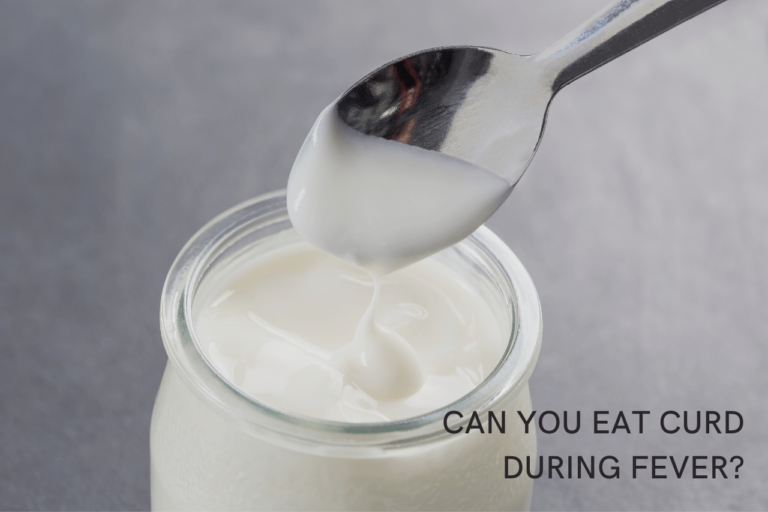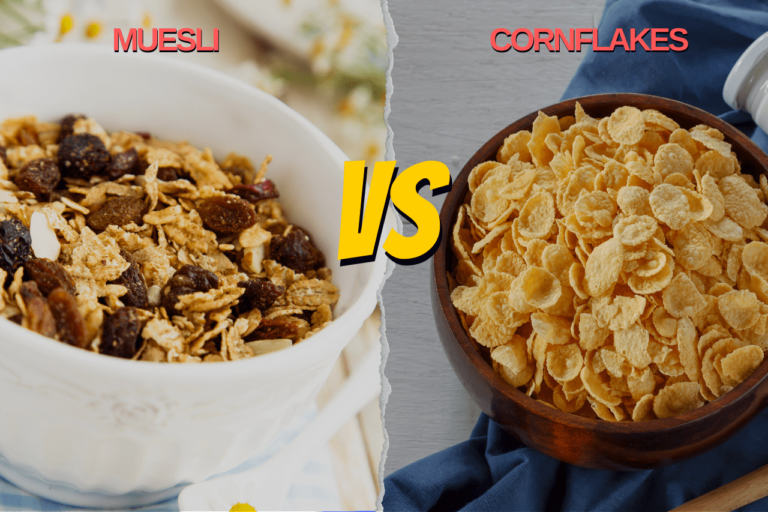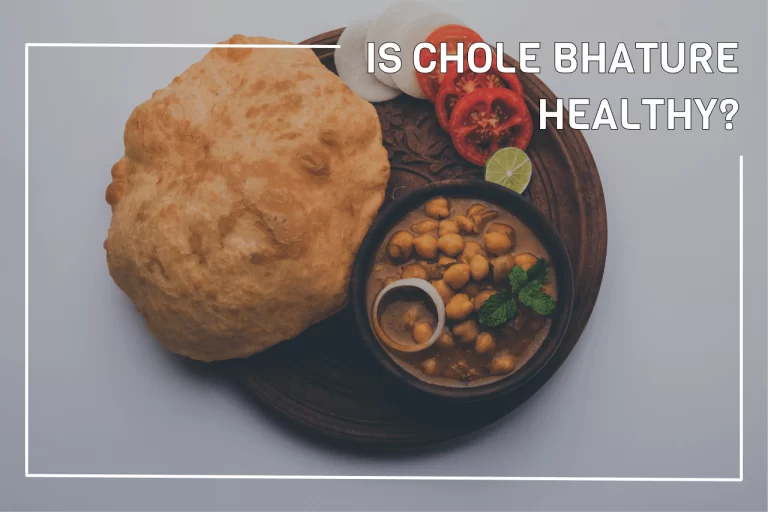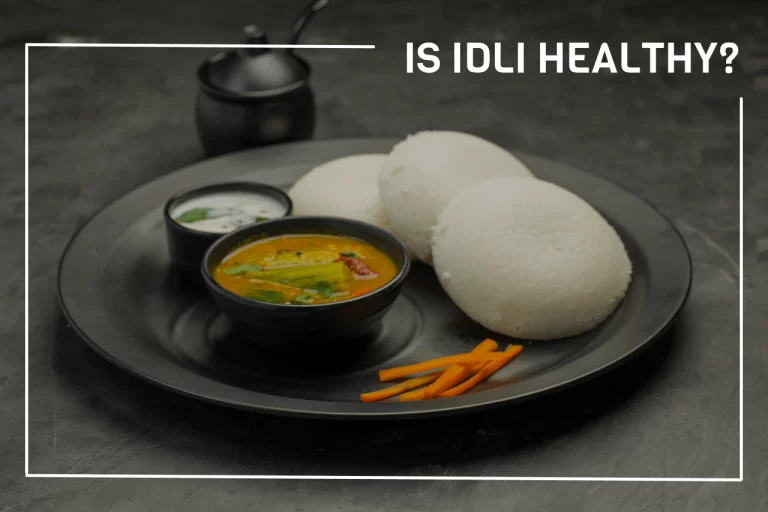With around more than 25% of the world’s population suffering from iron deficiency, it’s no wonder that this mineral is often cited as one of the most important to include in our diets. An iron deficiency can lead to fatigue, shortness of breath, dizziness, and other symptoms.
While there are many ways to increase your intake of Iron, including some iron-rich dry fruits into your daily diet is an easy way to make sure you’re getting enough.
Dry fruits have been an essential part of our daily diet for many years. They are easy to store and carry and can be eaten as a healthy snack at any time of the day.
In this article, we’ll go over 10 of the best iron-rich dry fruits to help you boost your daily iron intake and reduce your risk of iron deficiency in the future.
But first, let’s understand why iron is important.
The importance of Iron
According to the National Health Service, men over 18 require 8.7mg of iron per day and women aged 19 to 50 need 14.8mg per day.
However, more than 25% of people do not get enough iron in their diet, resulting in iron deficiency, also known as anemia, in the long run.
Iron deficiency in the body can be caused by a number of factors, such as:
- Not eating an iron-rich diet.
- Blood loss due to menstruation or any other reason.
- Extra iron is needed during pregnancy.
- Up to 70% of one’s iron is lost during vigorous exercise.
Getting enough iron in your diet is essential for your body because it helps in many ways, such as:
- Iron is important for making red blood cells, such as hemoglobin and myoglobin, which carry oxygen around the body.
- Iron is required for the production of hormones in your body.
- It boosts your immune system.
- Assists in the proper development of the brain.
- It helps to produce collagen and other essential proteins.
- Reduces fatigue
Top 10 Iron-rich dry fruits
Cashews
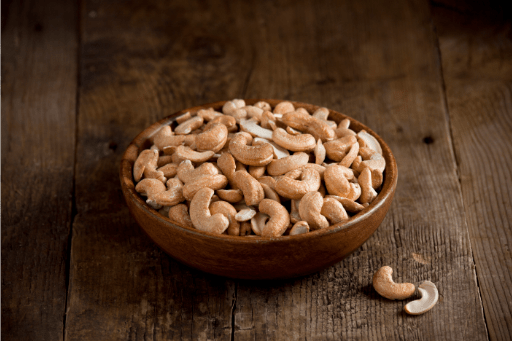
Iron content: 6.7mg in 100 grams
Cashews are the first among the best iron-rich dry fruits.
A 100 grams serving of cashews contain about 6.7 milligrams of iron, which is 75% of the recommended daily intake for men over 18 and about 45% for women. That’s more than the iron provided by popular iron-rich foods like shellfish, spinach, Red meat, legumes and quinoa.
Apart from being a rich source of iron, cashews are also a good source of fiber, protein, healthy fats and other minerals such as magnesium, zinc, copper, potassium, and manganese.
All these nutrients in cashews make it a must to include in your diet.
Pine nuts
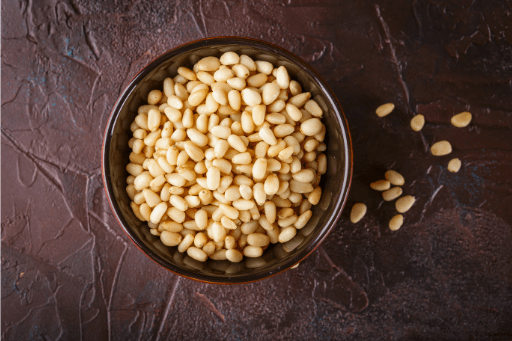
Iron content: 5.5mg in 100 grams
Pine nuts are the edible seeds of pine trees. They are small, round, and have a piney taste. These nuts can be eaten raw or roasted and are a common ingredient in pesto sauce.
These are among the second most expensive dry fruits worldwide and a good source of Iron. A 100 grams serving of pine nuts gives around 63% of daily value of iron for men and 37% for women.
Apart from Iron, pine nuts are also high in fiber, protein and magnesium.
Hazelnuts
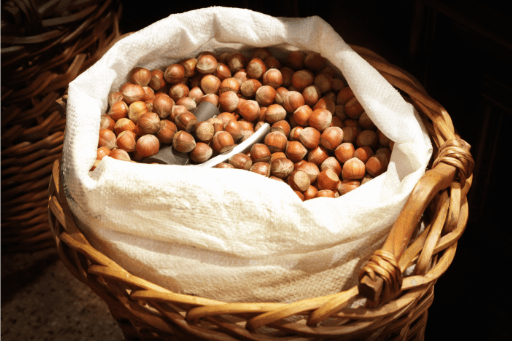
Iron content: 4.7mg in 100 grams
Hazelnuts are a type of nuts that grow on hazelnut trees. They are also known as filberts and are well known for their sweet and nutty flavor.
Hazelnuts are a good source of iron, providing 50% of the daily value for men and 30% for women.
In addition, hazelnuts are a great source of fiber that supports healthy bowel movements and promote weight loss. Moreover, eating hazelnuts regularly in men can help in increasing sperm count.
Also read: Hazelnut vs Chestnut: Which Is The Most Nutritious Nut?
Peanuts
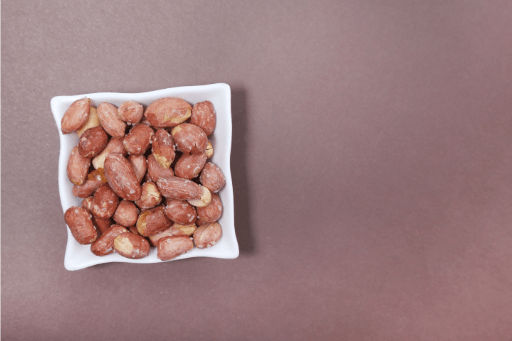
Iron content: 4.6mg in 100 grams
While peanuts are the most protein-dense of all dry fruits, they also contain a good amount of Iron for your body.
Peanuts are legumes, usually found in the form of oil or roasted, salted or unsalted.
A 100 grams serving of peanuts provides with more than 50% of the daily value of iron for men and 30% for women.
These nuts are also high in fiber, vitamins and minerals such as biotin, copper, niacin, folate, vitamin E and manganese.
Furthermore, peanuts are high in heart-healthy fats that can help people with high cholesterol levels.
Also read: Disadvantages of Peanuts: 6 Reasons to Limit Your Consumption
Pistachios
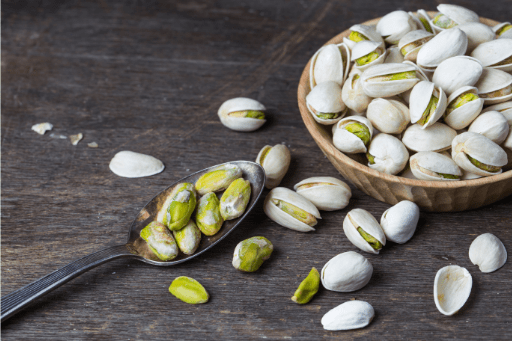
Iron content: 4mg in 100 grams
Pistachios are one of the most popular nuts in the world, with an annual production of close to 2 million tons. These are delicious, nutritious snacks that people have enjoyed since 3000 BC.
Pistachios are a great source of dietary iron, providing 45% of the daily value for men and 27% for women.
Furthermore, pistachios are high in fat, of which 90% is healthy for you and promote good cardiovascular health.
Almonds
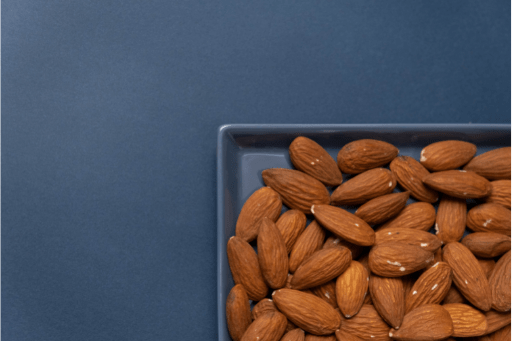
Iron content: 3.7mg in 100 grams
When it comes to eating healthy, you cannot leave almonds in the corner of your pantry.
Almonds are one of the most nutrient-rich nuts. These nuts have all the nutrients in them with a good amount.
Being rich in dietary fiber, protein, and healthy fats, almonds are also a rich source of iron.
A 100 grams serving of almonds provides 40% daily value of iron for men and 25% for women.
Studies suggest that eating almonds on a regular basis can help one in weight loss, Improve cardiovascular health, reduce the risk of cancer, brain and memory development and regulate blood sugar.
Walnuts
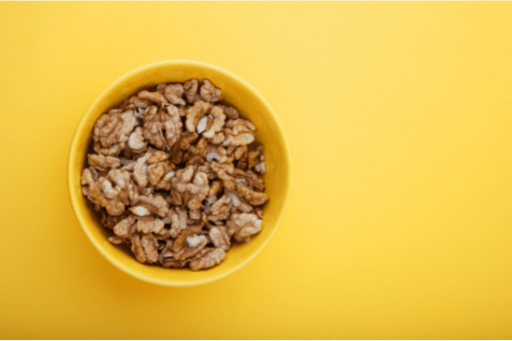
Iron content: 2.9mg in 100 grams
Walnuts are an excellent source of omega-3 fatty acids and should be included in your diet. Omega-3 fatty acids help improve cardiovascular health, reduce inflammation in the body, and boost mental performance.
They’re also high in other nutrients like protein, fiber, and, most importantly, iron. A 100 grams serving of walnuts provides 33% of the daily value of iron for men and 19% for women.
Studies say that people who eat walnuts two to four times per week have a 14% less risk of dying from heart diseases as compared to non-walnut consumers.
So what’s stopping you? Start eating walnuts.
Dried apricot
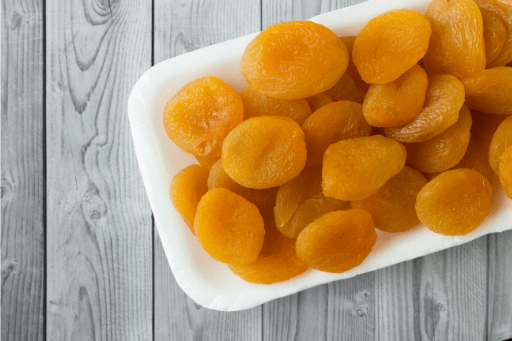
Iron content: 2.7mg in 100 grams
An apricot in its dried form is known as a dried apricot.
Dried apricots are a great way to add nutrients and fiber to your diet. They are low in calories and good potassium, vitamin A, and beta-carotene source.
These are also a good source of Iron, which can help support the production of hemoglobin and other important hormones.
A 100 grams serving of dried apricot provide 30% of the daily value of iron for men and 18% for women.
Also read: 8 Health Benefits of Dried Apricots That Will Surprise You
Pecans
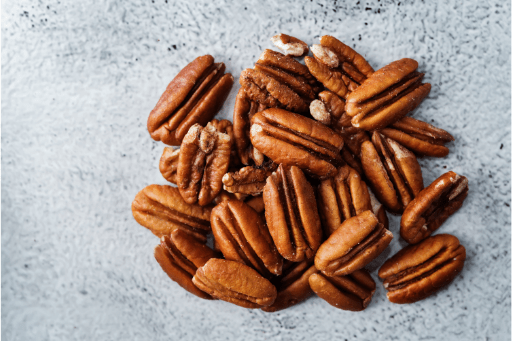
Iron content: 2.5mg in 100 grams
Pecans are a delicious addition to any meal and are easy to incorporate into your diet.
These are versatile nuts that can be cooked or raw. These are high in nutrients, including protein, fiber, antioxidants, and monounsaturated fats.
A 100 grams serving provides 28% of the daily value of iron for men and 16% for women.
Research suggests that eating pecans can help lower bad cholesterol and reduce the risk of heart disease, stroke, and cancer.
Raisins
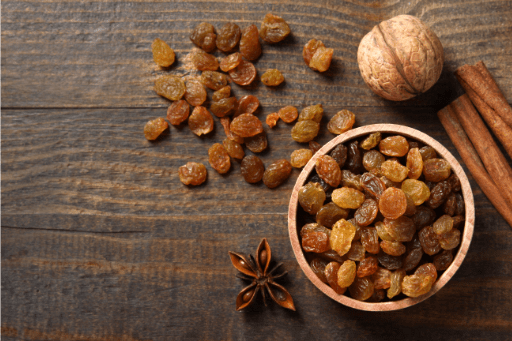
Iron content: 1.9mg in 100 grams
The last but not the least dry fruit in this list is raisins.
Raisins are one of the most versatile dry fruits because they can be used in cakes, cookies, bread and other baked goods or added to cereal, trail mix, yogurt and ice cream.
They are high in many nutrients such as fiber, potassium, vitamin c and Iron.
A 100 grams serving of raisins provides 20% of the daily value of iron for men and 12% for women.
Moreover, despite being sweet, raisins are ideal for diabetes and can help one lower the risk of heart disease, improve digestion, and support weight loss.
Other dry fruits that are rich in iron includes
- Macadamia nuts: 3mg in 100 grams
- Brazil nuts: 2.5mg in 100 grams
- Chestnut: 1.7mg in 100 grams
- Makhana: 1.4mg in 100 grams
- Dates: 1mg in 100 grams
How to include these dry fruits in your diet?
Dry fruits are a powerhouse of nutrients, and it’s so simple to include them in your daily diet.
Here are some tips to include dry fruits in your diet.
- Add them to your breakfast cereal or oatmeal.
- Toss them into a salad for lunch.
- Add them to your afternoon yogurt or fruit cup.
- Eat them as a snack.
- Use them as a topping on your desserts or ice cream.
- Add dry fruits to shakes and juices to enhance the flavor.
- You can use them in various sweet recipes, such as pudding or make a dry fruit laddo with them.
- You can make a dry fruit mix, then add it to a glass of milk and drink it.
Final words
Dry fruits are a healthy and convenient way to add more nutrients to your diet. And when it comes to getting your daily dose of Iron, these ten dry fruits are a great place to start.
These dry fruits are not only delicious, but they also provide a good source of fiber, vitamins, and minerals.
Make sure to regularly include them in your diet to boost your overall health and vitality.
If you found this information useful, share it with others and save them from iron deficiency.

